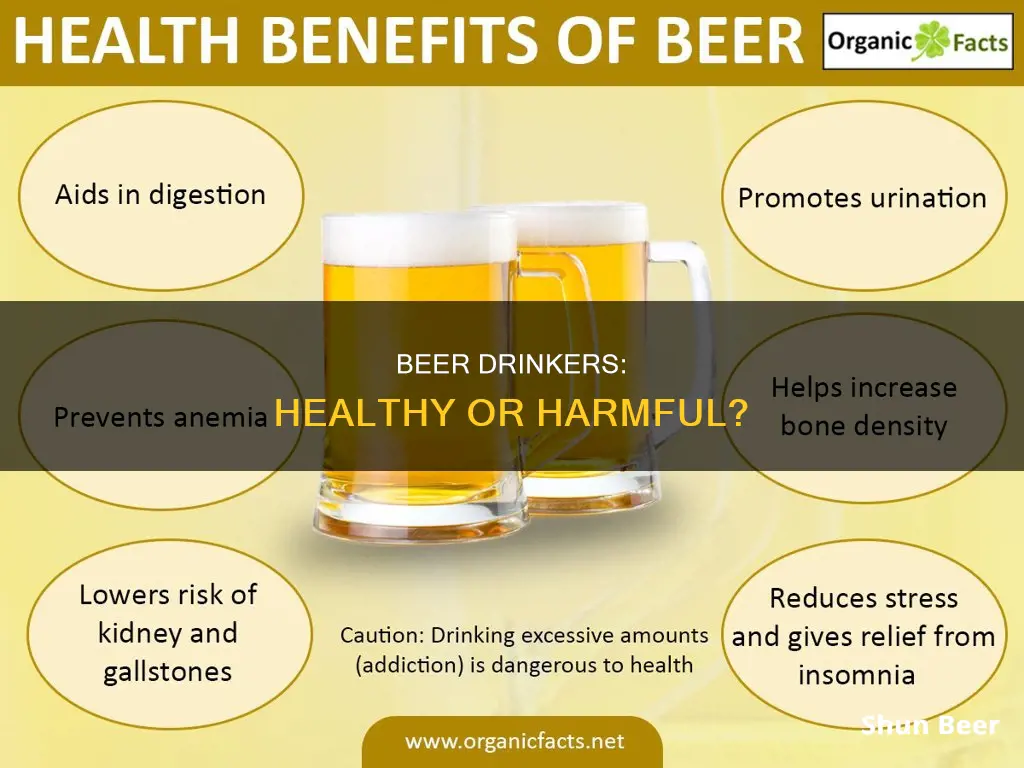
Beer is one of the oldest beverages in the world, with recipes found in Egyptian tombs, Mesopotamian archaeological sites, and Babylonian texts. Today, it is consumed globally and can be purchased in grocery stores and breweries or made at home.
Beer is made by fermenting starches, usually malted barley, with yeast. The modern brewing process also involves using hops and other flavouring agents.
There are several purported health benefits of beer, but these are largely dependent on moderate consumption. Drinking one or two standard beers per day may have positive effects on the heart, bones, blood sugar levels, and dementia risk. Beer is also said to improve cholesterol and reduce the risk of heart disease, osteoporosis, and certain cancers.
However, excessive consumption can lead to conditions such as cancer, liver disease, cardiovascular disease, and depression.
| Characteristics | Values |
|---|---|
| Nutritional value | Beer contains vitamins and minerals, including B vitamins, potassium, calcium, thiamine, iron, zinc, phosphorus, magnesium, riboflavin, and choline. |
| Health benefits | Decreased risk of heart disease, osteoporosis, type 2 diabetes, Alzheimer's disease, and dementia. Improved blood sugar control and bone density. |
| Negative effects | Excessive consumption can lead to cancer, liver disease, cardiovascular disease, weight gain, and depression. |
| Recommended intake | One drink per day for women and up to two drinks per day for men. |
What You'll Learn

Beer and heart health
Beer is one of the most popular alcoholic beverages worldwide. It is produced by fermenting starches, usually malted barley, with yeast. Beer has been consumed for thousands of years, and its potential health benefits and risks have been the subject of much research. Here is what we know about the relationship between beer consumption and heart health.
Potential Benefits
Several studies have suggested that light to moderate beer consumption may have positive effects on heart health. This is typically defined as up to one drink per day for women and up to two drinks per day for men, with one drink being approximately 12 ounces of beer.
Lower Risk of Heart Disease
Consuming one to two beers per day may help lower your risk of heart disease. Beer may be as effective as wine in improving general heart health when consumed at comparable alcohol levels. Some research indicates that moderate beer intake can improve the antioxidant properties of HDL ("good") cholesterol and enhance the body's ability to remove cholesterol, thereby reducing the risk of heart disease.
Improved Blood Sugar Levels
Drinking light amounts of beer may help reduce the risk of developing diabetes and improve blood sugar control for people with diabetes. One study showed that consuming one to two alcoholic drinks per day could lower the risk of developing diabetes by up to 50%. However, this benefit is most pronounced for low-sugar beers, such as light beers.
Potential Risks
Excessive alcohol consumption, including beer, can lead to serious health risks. Heavy drinking is defined as consuming more than two drinks per day for women or two to three drinks per day for men. Here are some of the potential risks associated with heavy beer consumption:
Addiction
Alcohol is an addictive substance, and heavy drinking increases the risk of dependency and alcohol use disorder. Additionally, excessive drinking can eliminate most of the potential health benefits associated with moderate consumption.
Reduced Life Expectancy
Heavy alcohol consumption significantly increases the risk of early death from all causes. Studies have shown that heavy drinking can reduce life expectancy by up to 28 years.
Increased Risk of Cardiovascular Disease
While moderate beer intake may lower the risk of heart disease, heavy drinking can have the opposite effect. Excessive alcohol intake can lead to high blood pressure, heart failure, stroke, and cardiomyopathy, a disorder affecting the heart muscle.
Liver Disease
Drinking more than two beers per day can increase the risk of developing fatty liver disease or cirrhosis.
Weight Gain
Beer is typically high in calories, and frequent consumption can lead to substantial weight gain, often referred to as a "beer belly." Studies have confirmed that drinking beer increases waist circumference.
In conclusion, light to moderate beer consumption may have positive effects on heart health, but heavy drinking can lead to serious health risks. It is essential to drink responsibly and in moderation to avoid the potential negative consequences associated with excessive alcohol consumption. As always, consulting with a healthcare professional is recommended to determine what is suitable for your specific circumstances.
Bourbon vs Beer: Which Alcoholic Drink is Healthier?
You may want to see also

Beer and bone density
Beer has been a part of human culture for thousands of years, and its consumption in moderate amounts may have some health benefits. Beer is made by fermenting grain into alcohol, and its potential health benefits are linked to its nutritional content. Beer is a rich source of B vitamins and minerals, including potassium, calcium, silicon, iron, and zinc.
Moderate beer consumption may be linked to increased bone density in men and postmenopausal women. This beneficial effect is attributed to the silicon content in beer, which promotes bone formation and inhibits bone resorption. A study by Pedrera-Zamorano et al. found that beer intake was associated with a significant increase in bone density in women. Additionally, Tucker et al. reported that moderate beer drinking of 1-2 beers per day was associated with increased bone density in both men and women. However, excessive beer consumption, exceeding two drinks per day, can lead to decreased bone density and an increased risk of fractures.
The positive effects of beer on bone density are also supported by a 2-year clinical trial conducted by Trius-Soler et al., which found that moderate beer intake increased bone formation markers in postmenopausal women. However, the study did not show a significant effect on bone mineral density or trabecular bone score during the intervention period.
In conclusion, while moderate beer consumption may have benefits for bone health, excessive drinking can negate these positive effects. Therefore, it is important to consume beer in moderation to maintain a healthy balance and avoid potential negative consequences.
Beer-Battered Fish: Healthy or Harmful?
You may want to see also

Beer and blood sugar control
Beer is produced by fermenting grain into alcohol, and it has been consumed for thousands of years. While beer has some health benefits, excessive consumption can lead to adverse health effects. Beer contains carbohydrates, which are absorbed into the bloodstream relatively quickly, leading to increased glucose levels. Therefore, drinking beer can influence blood glucose levels in several ways.
Firstly, beer can increase blood glucose levels due to its carbohydrate content. Usually, elevated blood sugar levels are observed shortly after consuming alcohol. However, drinking excessive amounts of beer can lead to reduced blood glucose levels, which may be dangerous for individuals with type 1 or type 2 diabetes using insulin. Hypoglycemia, or low blood sugar, caused by alcohol consumption, can result in mild symptoms such as fatigue and sweating, but it can also lead to severe consequences like seizures and loss of consciousness.
Secondly, alcohol interferes with blood sugar regulation by disrupting the hormones that control blood sugar levels. It diverts metabolic pathways, hindering glucose production in the liver and contributing to low blood sugar. Alcohol also decreases insulin sensitivity, impairing the body's ability to regulate blood sugar effectively. This interference with insulin sensitivity can lead to an increased risk of type 2 diabetes.
Additionally, alcohol stimulates the appetite, which may lead to overeating and further impact blood sugar levels. Alcoholic drinks are also typically high in calories, making weight management more challenging.
It is important to note that the effects of alcohol on blood sugar levels can be observed for up to 12 hours after consuming the last drink. Therefore, individuals with diabetes should be cautious when consuming beer and similar alcoholic beverages. While moderate consumption may have some benefits, excessive drinking can lead to negative health consequences.
Beer and Diabetes: What's the Verdict?
You may want to see also

Beer and dementia risk
Beer is one of the most popular alcoholic drinks worldwide, with a long history of consumption. While beer does contain some nutrients and may have certain health benefits, excessive drinking can lead to serious health issues.
Research suggests that light to moderate beer consumption may be associated with a reduced risk of dementia. However, heavy drinking increases the likelihood of developing dementia compared to not drinking at all. It is important to note that drinking alcohol, even in moderation, has been linked to a reduction in brain volume.
Several studies have found that consuming one to two beers per day for men and one beer per day for women may lower the risk of dementia. On the other hand, heavy drinking, defined as more than two drinks per day, is associated with an increased risk of dementia and other health issues.
The effects of alcohol consumption on dementia risk may vary depending on the type of dementia. For example, some studies suggest that light to moderate drinking may reduce the risk of vascular dementia, while the evidence for Alzheimer's disease is more contradictory.
It is worth noting that the group of non-drinkers may include former drinkers who had to quit due to health issues related to excessive alcohol consumption. This could skew the results, making it appear that non-drinkers have a higher risk of dementia.
In conclusion, while light to moderate beer consumption may be associated with a reduced risk of dementia, heavy drinking increases this risk. However, it is important to note that other factors, such as socioeconomic status and lifestyle choices, may also influence dementia risk. Therefore, it is not recommended to start drinking beer solely for dementia prevention.
Beer Brats: Healthy or Harmful?
You may want to see also

Beer and weight gain
Beer is a popular alcoholic drink that has been enjoyed for thousands of years. While it may have some health benefits when consumed in moderation, excessive beer drinking can lead to weight gain. This is due to several factors, including the calorie content of beer, its effect on fat burning, and the presence of phytoestrogens.
Firstly, beer is high in calories, with a standard 12-ounce (355-millilitre) serving containing around 153 calories. The calorie content varies depending on the alcohol content, with higher-alcohol beers containing more calories. As such, drinking multiple beers can contribute to a significant increase in calorie intake, leading to weight gain over time.
Secondly, alcohol consumption can prevent the body from burning fat. When you drink alcohol, your body prioritizes breaking it down over other sources of fuel, including stored fat. This means that regular beer drinking can contribute to an increase in body fat, especially when consumed in excess of 17 ounces (500 millilitres) per day.
Additionally, beer contains phytoestrogens, which are plant compounds found in the hops used for flavouring. These phytoestrogens can mimic the female sex hormone estrogen and may cause hormonal changes in men, potentially increasing the risk of storing belly fat. However, the exact effects of these phytoestrogens on weight and belly fat are not yet fully understood.
To minimize weight gain, it is recommended to drink in moderation, staying within the recommended limits, and to lead a healthy, active lifestyle. Binge drinking and excessive alcohol consumption should be avoided, as they are strongly linked to weight gain and other serious health problems.
Hard Seltzer vs Beer: Which Drink is Healthier?
You may want to see also
Frequently asked questions
Yes, drinking one or two standard beers per day may lower your risk of heart disease. Beer may be as effective at improving general heart health as wine at comparable alcohol levels.
Yes, beer contains silicon, an essential mineral for bone formation. Research has shown that moderate alcohol consumption may help decrease the risk of osteoporosis.
Beer is an excellent source of B vitamins and minerals. It also contains antioxidants, with darker beers tending to have more. Beer also has soluble fibre and significant levels of magnesium and potassium.
Excessive consumption of beer can lead to conditions such as cancer, liver disease, cardiovascular disease, and depression. Beer is also highly calorific and can contribute to weight gain.







